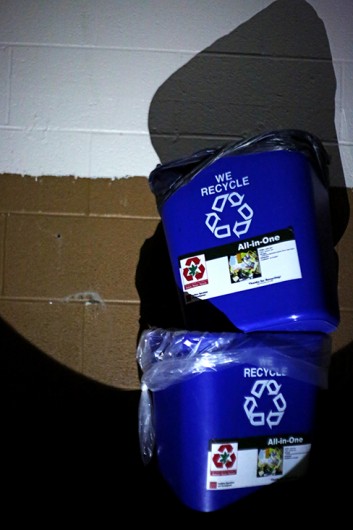If you’re caught recycling on campus this month, you could get $5 for your efforts.
RecycleMania has come to Ohio State, and students can get involved without even knowing it. During the duration of the eight-week RecycleMania competition on campus, student-volunteers will be walking through different parts of campus to catch people who are recycling correctly, said Carlos Lugo, the Energy Management and Sustainability program manager.
The recycling competition officially began on Feb. 1 and will continue through the end of March. RecycleMania is a national competition between universities in America and Canada to see which school can recycle the most, said Tony Gillund, the sustainability coordinator of OSU’s Energy Services and Sustainability
“RecycleMania seeks to motivate students, staff and others within the community to reduce their waste generation and support the recycling programs,” Gillund said. “It encourages this kind of benchmarking and to just have fun.”
Gillund said the competition records universities’ recycling habits in different categories such as waste minimization — which tracks the university that produces the least amount of recyclables, food organics and trash on a per person basis — and the grand champion category, which combines trash and each of the core recyclable materials, plus food organics, to determine a school’s recycling rate as a percentage of its overall waste generation.
OSU’s size helps it excel in one category in particular: the “Gorilla Prize.” Gillund said this category tracks “the overall weight totals that the university has. For instance, what is the total tonnage of recycling that they have.”
According to RecycleMania’s website, OSU collected 141,345 pounds of recycling in the first week of this year’s competition, almost five times what it collected in the first week last year. OSU also recycled about 1.41 pounds of recycling per person in the first week, more than four times where the university was at this time last year.
OSU will continue to track its total recycling during RecycleMania, and the university has designed an on-campus competition pitting the residence halls against each other to help encourage proper waste management. The halls will be facing off to see who can generate the most pounds of recyclable material from Feb. 16 to March 8, Lugo said.
Last year, the residence halls amassed 45 tons of recyclable material and the year prior, they collected 43 tons. This year the residence halls will look to continue the upward trend, Lugo said.
The on-campus competition, called March Recycling Madness, will hold activities to encourage students to recycle, Lugo said. Some residence halls will hold recycling-related events to engage their residents. For example, the Residence on Tenth held an event that taught students how to make bow ties and scarves out of reusable materials, he added.
The on-campus competition will help spread the word about RecycleMania, Lugo said. The competition sheds light on the campus’s recycling programs while encouraging students and staff to increase recycling efforts and reduce waste generation.
RecycleMania also provides recycling education. Gillund encouraged students to educate themselves on proper recycling techniques and to use the competition as an outlet to learn about OSU’s recycling programs.

![Ohio Gov. Mike DeWine signed Senate Bill 1 — a higher education overhaul bill — into law Friday. [Ohio Gov. Mike DeWine speaks at the State of the State address in Columbus. Credit: Joshua Gunter via TNS]](https://www.thelantern.com/files/2025/03/20250204-AMX-US-NEWS-DEWINE-BUDGET-INCREASES-TAXES-FOR-1-PLD-384x253.jpg)

